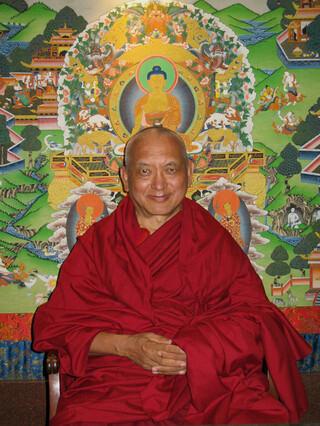Do not commit any unwholesome actions.
Engage in perfect, wholesome actions.
Subdue one’s own mind.
This is the teaching of the Buddha.
This stanza shows the four noble truths, the very fundamental teaching of the Buddha. What it’s saying is that the root of all the karma and delusions and of all the sufferings of samsara is the ignorance not knowing the meaning of selflessness, the very nature of the ultimate reality of the I and the ultimate reality of the aggregates, the meaning of selflessness of the person and the meaning of selflessness of the aggregates. It is the mind unknowing of that.
As I mentioned at other times, the mind perceives that the aggregates exist by seeing the function they do. Then, that mind merely imputes the “I,” simply makes up the label “I,” the “self,” and believes in that. The mind makes up the label. The mind we can’t see, which is formless but which exists, which because its nature is clear does the function of perceiving objects, that mind, which is also empty.
What is the mind? It is nothing except what is imputed by the thought because there is the base, this phenomenon whose nature is clear and which perceives an object. Because it is formless and exists and because it has this function, it is the valid base. So, the thought merely imputes “mind.” Therefore, because of this valid base, which is formless and whose nature is clear and whose function is to perceive an object, the label “mind” exists, which is merely imputed by thought. It is just a mere imputation.
Therefore, mind does not exist from its own side. Therefore, mind is empty of the real mind. The way it appears to us, the way our hallucinated mind apprehends it and we believe it to exist—it is empty of that. The mind is empty of that hallucination; it’s empty of the way it appears to us, to our hallucinated mind, and the way our hallucinated mind believes it to exist. We believe a hundred percent there’s a real mind existing from its own side, but it is totally empty. The mind is totally empty of that real mind, that truly existing mind, what we normally believe all the time.
That is the ultimate nature of the mind, what is called clear light. The nature of the mind is clear light. In Tibetan it’s ösel. The meaning of “clear light” is the emptiness of the mind. The term clear light refers to this, to the emptiness of the mind. That is the potential to become a buddha. In some other traditions it’s called the dharmakaya itself, the buddha. The way of labeling it in some traditions is “buddha” or “dharmakaya.”
In the Lama Tsongkhapa tradition, as explained by the Buddha or Nagarjuna, this is the potential to become a buddha. Sometimes you may see in the teachings it’s called “buddha,” but it means the potential to become a buddha. It’s either labeled as the result time, labeled as the result of what we are going to achieve, or it’s labeled as the present, indicating the potential. So, the teachings might seem contradictory like that, but that is the reason. However, it’s the potential to become a buddha.
The clear light means that there is the potential to become a buddha. That means everybody can achieve enlightenment.
In A Guide to the Bodhisattva’s Way of Life Shantideva said,
[7:18] If they develop the strength of their exertion,
Even those who are flies, mosquitoes, bees and insects
Will win the unsurpassable Awakening
Which is so hard to find.
Even cockroaches, mice, crocodiles, bugs, spiders, lice! No matter how tiny they are, those we can see only through a microscope, even they have buddha nature; even they can achieve enlightenment. That doesn’t mean they can do it at that time or with that body. It’s not saying that, but generally speaking, because of that they can achieve enlightenment.





























